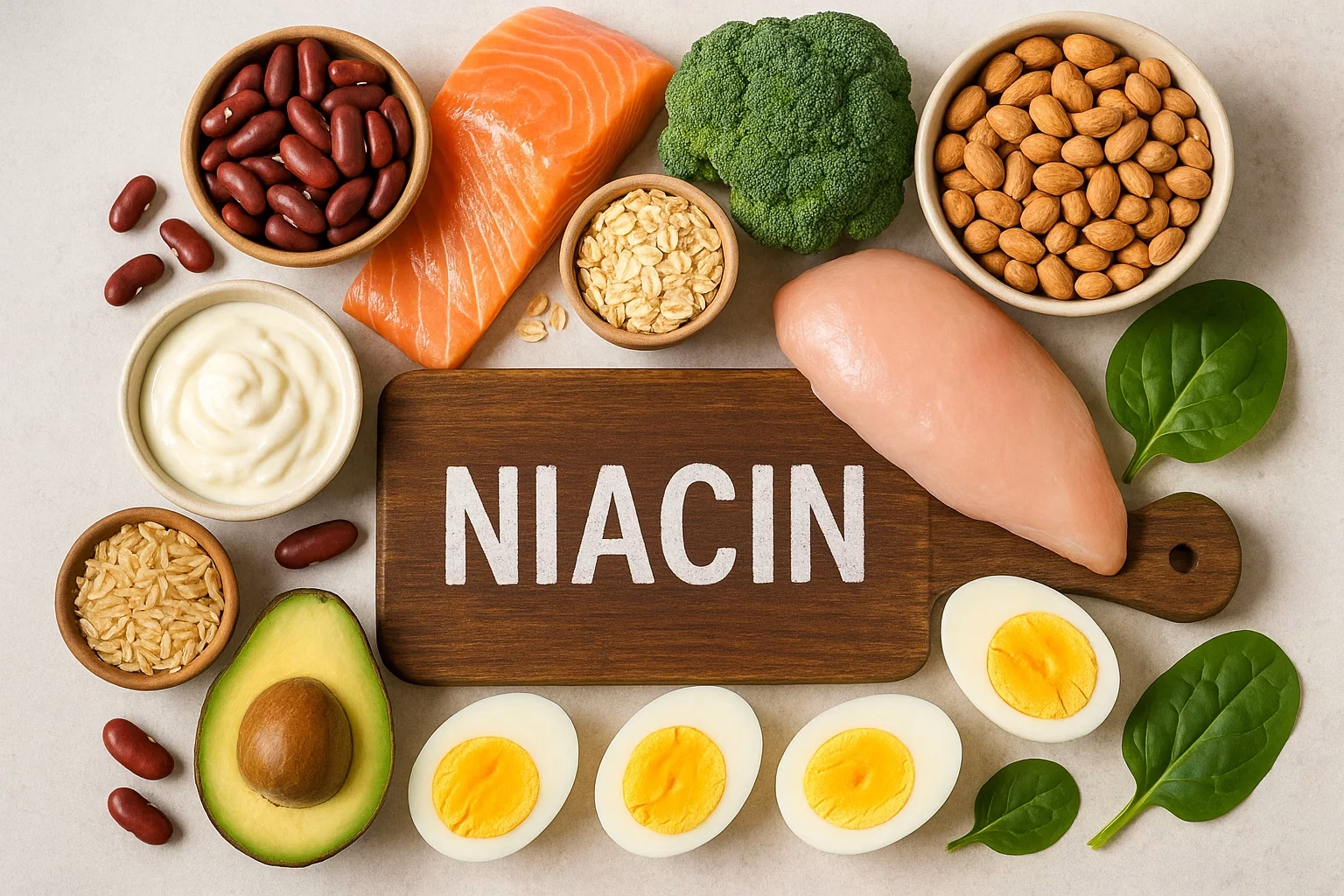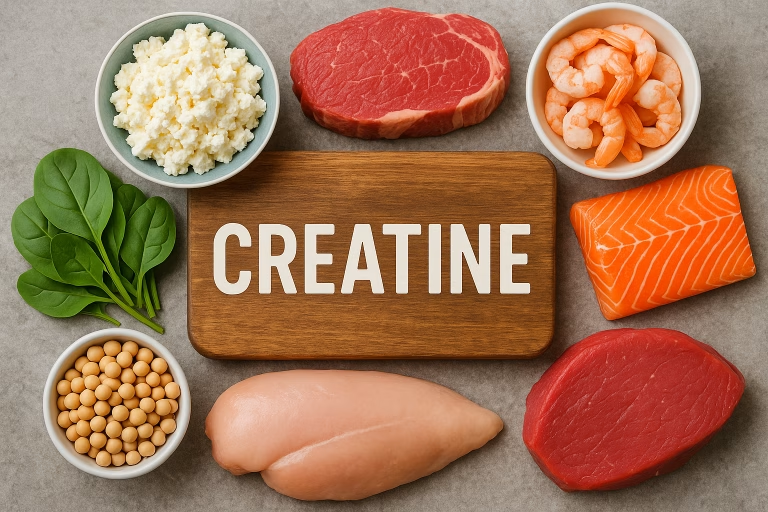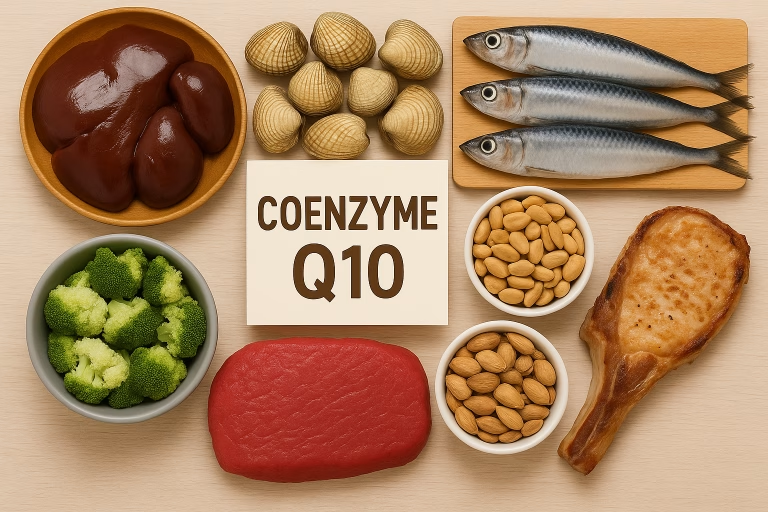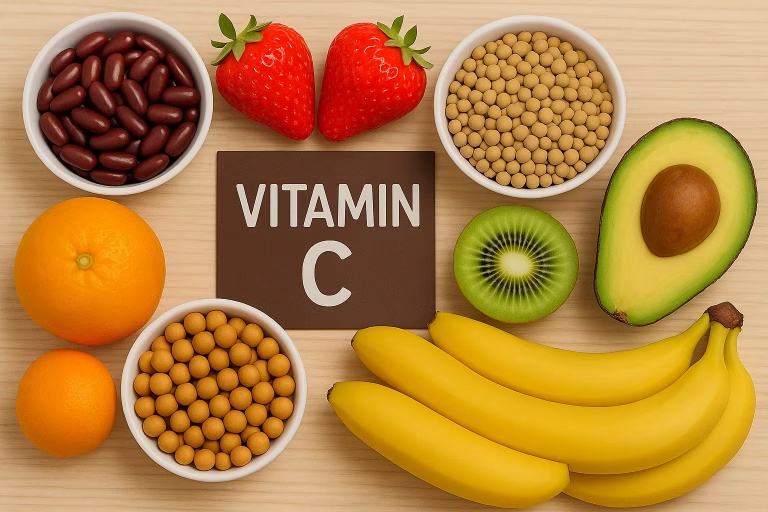Niacin (Vitamin B3) Review for adults over 40
What Is Niacin (Vitamin B3)?
Niacin, also known as vitamin B3, is a water-soluble B-vitamin that plays a vital role in converting food into energy, supporting healthy skin, promoting brain function, and maintaining cholesterol levels. It exists in two primary forms: nicotinic acid and niacinamide (nicotinamide), each offering distinct benefits for the body.
Why Niacin Matters After 40
As we age, metabolic efficiency and cardiovascular health tend to decline. Niacin supports energy metabolism and heart health — two major concerns for adults over 40. Niacin also helps maintain healthy skin, cognitive performance, and circulation, which can decline with age.
Health Benefits of Niacin
1. Supports Healthy Cholesterol Levels
Niacin is well-known for its cholesterol-lowering effects. It can increase HDL (“good”) cholesterol while lowering LDL (“bad”) cholesterol and triglycerides. Though prescription-strength niacin is often used under medical supervision, dietary niacin also contributes to better lipid profiles.
2. Boosts Brain Function
Vitamin B3 is crucial for brain health. It helps produce NAD (nicotinamide adenine dinucleotide), a compound vital for cellular energy and cognitive performance. Some research links niacin deficiency to cognitive decline and neurodegenerative diseases like Alzheimer’s.
3. Improves Skin Health
Niacinamide is commonly used in topical skincare for reducing inflammation, acne, and signs of aging. Oral niacin also supports skin hydration and elasticity, making it a key nutrient for aging adults who want to preserve youthful skin.
4. Enhances Energy Metabolism
Niacin plays a role in the metabolism of carbohydrates, fats, and proteins. For adults over 40, whose metabolism naturally slows, ensuring adequate niacin intake helps combat fatigue and supports weight management efforts.
5. Promotes Circulation and Reduces Inflammation
Niacin improves blood flow and has anti-inflammatory properties, making it beneficial for cardiovascular and joint health. This can help reduce age-related stiffness and protect against vascular disease.
Recommended Daily Dosage
The recommended daily intake of niacin for adults is 16 mg for men and 14 mg for women. However, therapeutic doses can be much higher when taken under medical supervision, especially for cholesterol management. Exceeding 35 mg per day may cause flushing, a harmless but uncomfortable skin reddening.
Top Food Sources of Niacin
- Chicken breast
- Turkey
- Salmon
- Tuna
- Beef liver
- Brown rice
- Peanuts
- Whole grains
Fortified cereals and nutritional yeast are also excellent sources for those following plant-based diets.
Supplementing with Niacin
Niacin is available in various supplement forms, including:
- Nicotinic Acid: Used for cholesterol reduction, but may cause flushing.
- Niacinamide: Non-flushing and often used for skin and joint health.
- Inositol Hexanicotinate: A flush-free form of niacin marketed for cholesterol and energy support.
Look for third-party tested products with clear labeling. Dosage and form should align with your health goals.
Side Effects and Safety
High-dose niacin supplementation (over 500 mg/day) can cause side effects such as:
- Flushing and warmth of the face
- Headaches
- Upset stomach
- Liver toxicity (at very high doses)
Always consult a healthcare provider before starting niacin at therapeutic levels, especially if you have liver disease, diabetes, or take medications.
Who Should Consider Taking Niacin?
- Adults over 40 experiencing fatigue or poor circulation
- People with high cholesterol who cannot tolerate statins
- Individuals with niacin-deficient diets (low in protein or processed foods)
- Those with skin concerns like acne or rosacea
Niacin Deficiency: Signs and Risks
Severe deficiency, called pellagra, is rare but possible with malnourishment or alcoholism. Symptoms include:
- Diarrhea
- Dementia
- Dermatitis
- Depression
Even mild deficiency can lead to fatigue, poor concentration, and skin issues. Regular intake helps prevent these symptoms.
Niacin vs Other B Vitamins
Compared to other B vitamins like B6 and B12, niacin plays a broader role in cardiovascular health and cholesterol regulation. While all B vitamins support metabolism and neurological health, niacin’s effects on lipid balance make it unique.
Conclusion
Niacin (Vitamin B3) is a powerhouse nutrient essential for energy, cholesterol balance, brain function, and healthy skin — especially for adults over 40. While diet should always be the first source, supplementation can offer substantial benefits when used wisely. If you’re looking to support your aging body and mind, consider discussing niacin supplementation with a qualified healthcare provider.
Want more personalized supplement advice? Visit our other expert reviews at Vitamins 40 Plus and find the best plan for your health journey after 40.







